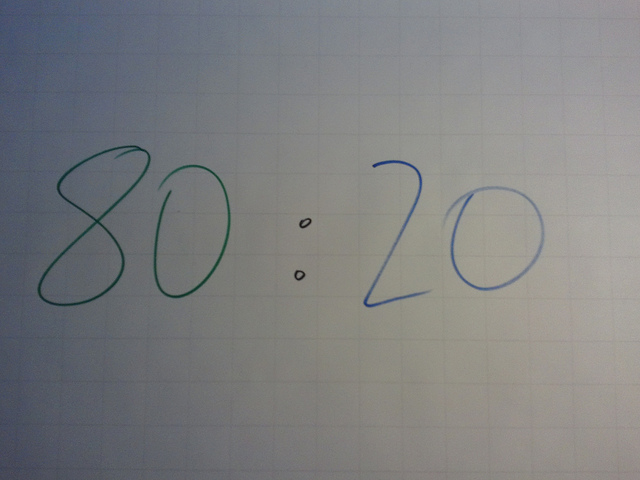Editor’s Note: This is a guest post from Amar Vyas, the author of NRI: Now, Returned to India

The Pareto Principle, commonly known as the 80:20 rule, says, “for many events, roughly 80% of the effects come from 20% of the causes.” This principle applies to most parts of the world.
But not to India.
In my experience, 20% of the work takes up 80% of your time here. The Pareto principle in India should be referred to as the Oterap principle (that’s Pareto reversed). Not surprisingly, this 20% of work is dependent on others: plumbers, electricians, or maybe even your tax consultant.
Let me give you an example.
The other day, I needed to print a thirty-page draft of a report at my office. I left home bright and early so that I could print the draft and then review, edit and finalize the report. When I hit the print button from my desk, the printer beeped, beeped and then beeped again, because it only had about ten sheets in the tray. The copier paper was locked away nicely in the supply cabinet, and the office attendant who had the key was only going to reach by 9 AM. In other words, my plans of finishing the work early would not be realized for another hour and a half.
Frustrating? Indeed. Even after seven years of being back home, I find it challenging. The questions pile up in my mind:
“Why don’t they fill up the paper tray before leaving the office?”
“What is the need to keep the office supplies under lock and key?”
“Why does it only happen to me?!”
To overcome this frustration, we have to develop greater understanding.
Many people work late hours here, and working long hours is often equated with working hard. The office attendant may have filled up the tray last night, but what if these late (I mean hard) working people, printed several pages and nearly emptied the tray in the process?
And remember, Indians have a strong belief in frugality that leads to believing that what is scarce needs to be guarded. According to some, office supplies are scarce, therefore they need an extra layer of protection. So there is no point getting frustrated when you realize that the copy paper sits in a locked cabinet.
And finally, it happens to all of us, and not just ‘me’.
So take a deep breath, walk around the office, and swipe some paper from a different printer. That’s how you get the job done.
Going back to our Oterap Principle, 80% of my time was spent looking for the paper, and I spent the remaining 20% reviewing and finalizing the report, which was the primary task. But this is how things work in India, and the sooner we realize and get used to it, the better for all of us.
The situation at home is no different. I was about to start working on my next novel last night when the lights went off (again). Just then, my dog Buddy started howling; it was time for his walk. But we had to wait till the electrician fired up the diesel generator so that the elevators could take us downstairs (we’re on the tenth floor).
Just as Buddy and I were about to leave, my wife reminded me again that her mobile phone needed to be charged. But since the battery in the inverter was running out of juice, recharging the phone was out of the question. In the middle of all this, Buddy raised his hind leg near the dining table, my wife went wild with anger, and I had to drop everything and clean it up. Sorting out the whole matter took me nearly an hour.
Before I could start writing again, my phone buzzed. It was the car insurance company who wanted to confirm my address. I had updated the information on their website the day before, and the phone call was to confirm my action. Of course, they first had to verify that I was indeed the right Amar. After two hours of managing this chaos, I was able to find that half an hour that I needed to write.
Be it office, or workplace, or a social gathering, or a visit to the mall, the Oterap principle holds true. The sooner you learn it and internalize it, the sooner you can live at peace.
Image Credit: Thomas M on Flickr





Which house in the world would have a diesel generator (i.e. 24 hour back-up) with inverter? Am I missing something, or is this a cheap writer looking for some thrills (which I am fueling up)?
But this is how things work in India, and the sooner we realize and get used to it, the better for all of us.
The sooner you learn it and internalize it, the sooner you can live at peace.
Now, I have only been in India for 4 years compared to your 7, but this sounds unnecessarily fatalistic to me. I realize this is the way things are at the present moment, but silent resignation seems defeatist to me. Unless, of course, you think this is just an alternate way to live, rather than an inefficient and stressful lifestyle.
Call me materialistic, but the cultural quirks you have described are functions of population density, availability(scarcity) of resources, interpersonal trust, etc. Your “Oterap” principle probably applied once to countries we call “developed” today, and knowing that those countries grew to be egalitarian high-trust societies where there is no rat race for basic resources, there’s no reason the same cannot happen in India as well. Unless thee is a lack of will. For my part, I keep pushing back at the behaviors you described in the article, and will continue to do so, trying to explain to people around me why change is desirable.
Thanks for the comment. This was a guest post, and I’ve notified the author, but here’s my take:
I think there is a certain type of fatalism that you need to accept to do well here. Not in a purely negative way, but in a “things are not likely to change” way. Trying to force processes to work and obey your plans is a recipe for stress and disaster.
The reason behind these things are many, as you’ve noted (population density, etc). The idea is not that ‘developed’ countries have eliminated all these things and are therefore superior. Just that certain inefficiencies remain and will likely be here for a long long time.
For me, I found my life to be much more enjoyable in India when I learned to adapt, not expect too much, and structure my life around things I could control the best. That’s how I have handled it.
amarvyas78@gmail.com